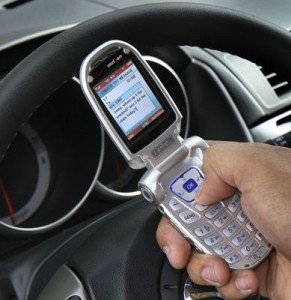 RICHMOND – At its annual Reconvened Session at the Virginia state capitol in Richmond, the General Assembly approved a set of amendments proposed by Gov. Robert F. McDonnell, including HB (House Bill) 1907, the driving-while-texting bill patroned this year by Del. Richard L. Anderson (R-Prince William). The bill moved through the House and Senate with substantial support and wide voting margins and is now on Gov. McDonnell’s desk for signature.
RICHMOND – At its annual Reconvened Session at the Virginia state capitol in Richmond, the General Assembly approved a set of amendments proposed by Gov. Robert F. McDonnell, including HB (House Bill) 1907, the driving-while-texting bill patroned this year by Del. Richard L. Anderson (R-Prince William). The bill moved through the House and Senate with substantial support and wide voting margins and is now on Gov. McDonnell’s desk for signature.
For the first time, Virginia’s motor vehicle texting laws have deterrent value and join three dozen other states that have similar laws on the books.
At an early morning press conference at the state capitol, Del. Rich Anderson outlined details of the bill. He was joined by fellow legislators and representatives of DRIVE SMART Virginia and the Virginia Coalition for Distraction Free Driving.
As a result of the General Assembly’s action, texting while driving is now elevated from a secondary to a primary offense, meaning that law enforcement officials may stop drivers who they see texting and emailing behind the wheel. Additionally, the amendments to Anderson’s bill substantially increase the penalties for driving while texting, from $20 to $125 for a first offense and from $50 to $250 for second and subsequent offenses. The violation will be carried as a standard traffic offense, unless it produces dangerous actions that fall under the state’s reckless driving statutes.
One additional amendment proposed by McDonnell requires the Virginia Department of Criminal Justice Services to make training available to state and local law enforcement agencies for applying the new law.
During debate on the House floor, Anderson moved that his colleagues accept the governor’s amendments, observing that the new fine structure for texting while driving aligns the penalty with driving while intoxicated. Anderson stated that “both practices are forms of impaired driving that impede the ability of vehicle operators to drive safely and threaten the lives and safety of others on the road. I couldn’t be more pleased that this bill is now on the governor’s desk after being attempted by a number of my fellow legislators over the last half-dozen years.”
As the floor manager for the bill, Anderson discovered broad legislative support for his bill. In fact, 42 House members from both parties signed onto his bill as co-patrons, wishing to have their names attached to his legislation. A total of seven driving-while-texting bills had been introduced at the beginning of the legislative session, but Anderson’s bill was deemed by the House leadership to be the most effective approach, resulting in incorporation of all other bills into HB 1907. As a result, Anderson assumed leadership responsibility for successfully navigating the bill through the Virginia House and Senate.
Anderson’s bill originated in the summer of 2012 at the request of a Prince William County family of three sisters whose brother had been killed in April 2012 by a texting driver. The local family met with Anderson and convinced him of the need for legislation. The delegate then worked through the summer, fall, and early winter to draft his bill and garner the necessary support to get it through both houses of the legislature.
In the process, Anderson worked with various Virginia state agencies, DRIVE SMART Virginia, and the Virginia Coalition for Distraction Free Driving. He also worked with the National Conference of State Legislatures (NCSL), where he serves on the NCSL Executive Committee that governs the affairs of this national legislative organization of all 7,400 state legislators from the 50 states and several U.S. territories.
In reflecting on successful passage of his bill, Anderson stated that “I couldn’t be happier that this legislation passed. Many legislators have worked for many years on similar bills, so I’m pleased with the result. I didn’t do this alone, and I especially appreciate the bipartisan work that State Sen. George L. Barker (D-39th) did with me in ensuring that our bill passed the House and Senate and that his companion texting bill had the same success.”
Said Anderson, “I can’t wait to stand behind Gov. McDonnell with families who have lost loved ones and watch him put pen to paper in making HB 1907 the law of the Commonwealth.”
Effective date of the law will be July 1, 2013, after training has been prepared and sent to state and local law enforcement agencies to administer.
Article submitted by the Office of Delegate Richard Anderson
Support Bristow Beat - Donate Today!